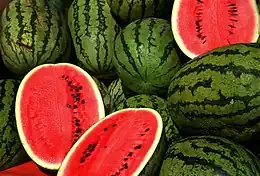אבטיח
Hebrew
Etymology 1
| Root |
|---|
| ב־ט־ח (b-ṭ-ḥ) |
Cognate with Aramaic אֲבַטִּיחָא and Arabic بَطِيخ (baṭīḵ), mentioned once, in the plural form, in the Hebrew Bible, Numbers 11:5 "זָכַרְנוּ אֶת־הַדָּגָה אֲשֶׁר־נֹאכַל בְּמִצְרַיִם חִנָּם; אֵת הַקִּשֻּׁאִים וְאֵת הָאֲבַטִּחִים". In the King James Version, אבטיחים is translated into "melons" rather than "watermelons": "We remember the fish, which we did eat in Egypt freely; the cucumbers, and the melons, and the leeks".
Noun

אֲבַטִּיחִים (the fruit)
אֲבַטִּיחַ • (avatíakh) m (plural indefinite אֲבַטִּיחִים)
- (biblical) some species of fruit similar to the modern watermelon or melon
- Numbers 11:5, with translation of the Jewish Publication Society:
- זָכַרְנוּ אֶת־הַדָּגָה אֲשֶׁר־נֹאכַל בְּמִצְרַיִם חִנָּם אֵת הַקִּשֻּׁאִים וְאֵת הָאֲבַטִּחִים וְאֶת־הֶחָצִיר וְאֶת־הַבְּצָלִים וְאֶת־הַשּׁוּמִים׃
- zakhárnu 'et-hadagá 'asher-nokhál b'mitsráyim khinám 'ét hakishu'ím v'ét ha'avatikhím v'et-hekhatsír v'et-hab'tsalím v'et-hashumím.
zāḵárnū ʾeṯ-haddāḡā ʾăšer-nōḵal bəmiṣráyim ḥinnām ʾēṯ haqqiššūʾīm wəʾēṯ hāʾăḇaṭṭīḥīm wəʾeṯ-heḥāṣīr wəʾeṯ-habbəṣālīm wəʾeṯ-haššūmīm. - We remember the fish, which we were wont to eat in Egypt for nought; the cucumbers, and the melons, and the leeks, and the onions, and the garlic;
- zakhárnu 'et-hadagá 'asher-nokhál b'mitsráyim khinám 'ét hakishu'ím v'ét ha'avatikhím v'et-hekhatsír v'et-hab'tsalím v'et-hashumím.
- Numbers 11:5, with translation of the Jewish Publication Society:
- watermelon (fruit of the species Citrullus lanatus)
- watermelon (plant of the species Citrullus lanatus)
References
- H20 in Strong, James (1979) Strong’s Exhaustive Concordance to the Bible
- “אבטיח” in the Hebrew Terms Database of the Academy of Hebrew Language
Further reading
 אבטיח on the Hebrew Wikipedia.Wikipedia he
אבטיח on the Hebrew Wikipedia.Wikipedia he
This article is issued from Wiktionary. The text is licensed under Creative Commons - Attribution - Sharealike. Additional terms may apply for the media files.